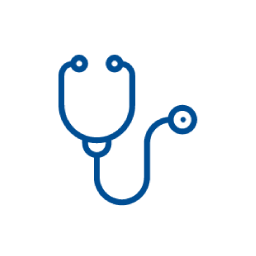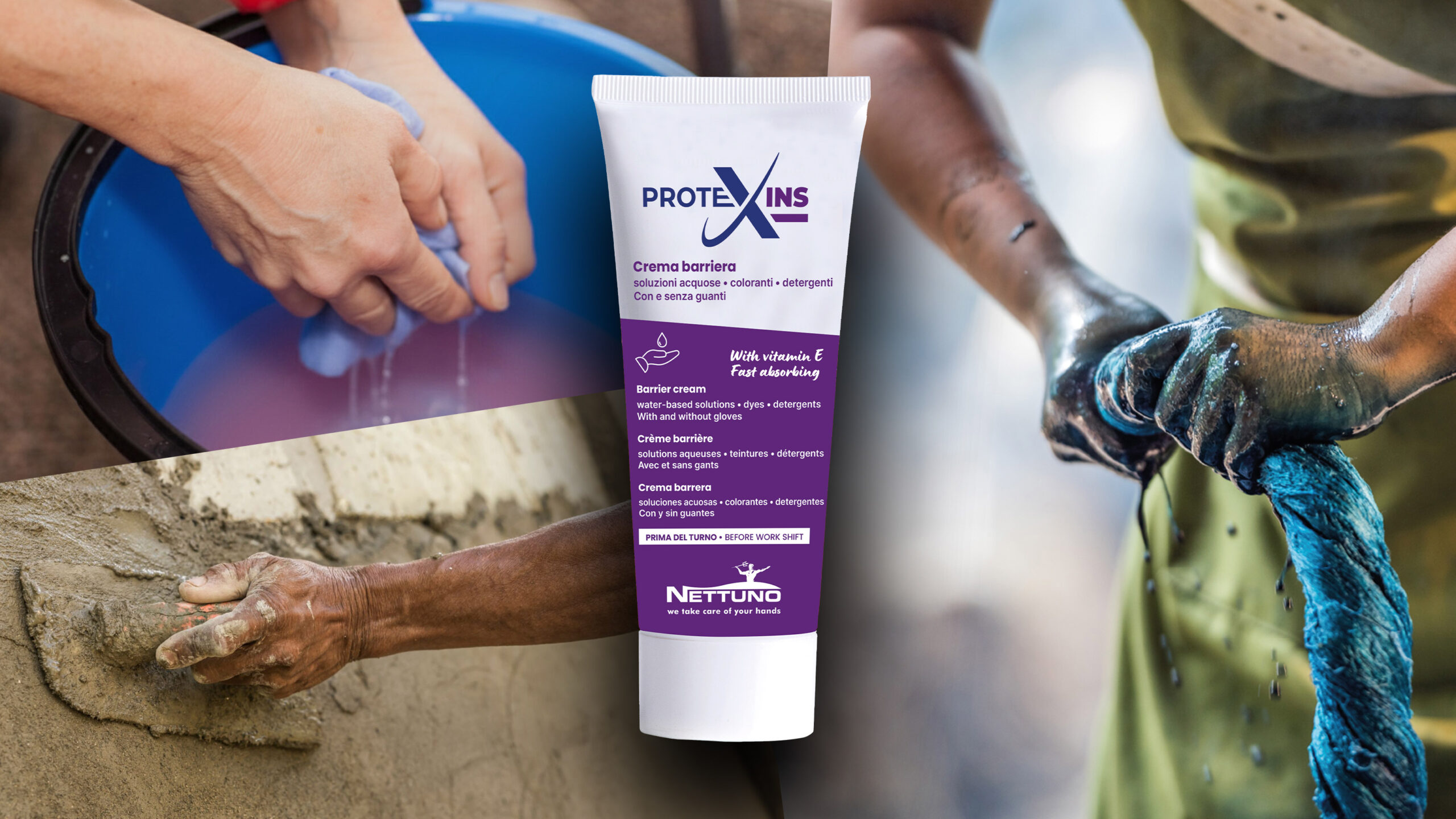Bacteria on hands: what are they and what are the risks
Our skin is naturally colonised by numerous micro-organisms and, if with many of them coexistence is completely peaceful, pathogenic bacteria on the hands is also very common
Knowing them is essential and it is even more important to know how to adequately protect yourself from the dangers that this coexistence can entail, especially if you work every day in professional environments particularly at risk.
We can further analyse the topic by discovering the most sensitive sectors from a health point of view, but also good hygiene practices and the best Nettuno products to care and cleanse the skin on your hands.
Bacterial flora: what is living on our skin?
There are basically two categories of microbes living on our skin. On the one hand, there is resident microbial flora, made up of organisms that nestle in the deep layers of the skin and which are not easily removed by hand washing, but which rarely cause infections (about 20% of the germs on the hands are harmless).
On the other hand, transient microbial flora, which manages to colonise the skin thanks to contact with surfaces, the environment or other infected individuals. These micro-organisms live in the most superficial layers of the skin and, if they find an ideal environment, begin to multiply at a surprising speed, surviving for a long time and spreading again in the common areas.
Pathogens that colonise the surface of our skin can be responsible for many diseases, from the mildest, such as colds or flu, to the most serious such as toxoplasmosis, conjunctivitis, intestinal flu, but also typhus, hepatitis A, cholera, salmonellosis.
Fortunately, these germs can be eliminated by careful hand washing, but also by using the most effective sanitation processes.
How do you come in contact with bacteria and pathogens?
Contact with these dangerous carriers of disease is, unfortunately, very common both in private life and in workplaces with high attendance, especially if they are characterised by a high degree of dirt or particularly delicate conditions (such as healthcare or the food industry).
The skin surface is not the only place where pathogenic micro-organisms like to nest. In fact, bacteria on your nails pose another significant problem, because large amounts of dirt and germs can settle in the spaces between the corneous layers and the skin, which are often not completely removed by normal hand washing.
In addition, it has been shown that the widespread use of false nails can worsen the situation and contribute to pathogenic proliferation, as well as the risky perforation of gloves, used as essential PPE by many categories of professionals, such as healthcare professionals.
The sectors most at risk of bacteria on the hands: healthcare and food
Assisting patients is one of the riskiest due to the spread of bacteria and other pathogenic germs. Despite mass diffusion of the best prevention and sanitation measures in the Western world, the transmission of bacterial infections from sick people to healthy people is the order of the day in places where the concentration of bacterial loads is higher and, often, patient immune defence is impaired.
Regular hand hygiene can reduce the number of infections associated with common care practices by 30/40%. Therefore, anyone working or frequenting sanitary environments for any reason is required to know the contamination methods and follow all the preventive procedures of hand washing and sanitation.
The same can be said of operators working in contact with food, at any stage of the production chain, packaging or distribution. A safe food chain should always feature the basic rules of cleaning and sanitation, of the environments, the working tools and the skin surfaces of the employees in contact with food and beverages.
Offices and communities: high risk areas?
Some places may appear “sheltered” from the spread of pathogenic germs, but they really are not. Let’s take for example offices, schools, universities, stations, gyms, premises and, more generally, all environments frequented by a multitude of people and characterised by a certain degree of casualness. Handles, doors, chairs, keyboards, telephone handsets, cash, buttons and the like are all possible receptacles of bacteria.
All these high traffic spaces are constantly populated by numerous micro-organisms and it is not uncommon to find a wide variety of bacteria on the hands of those who frequent them every day. In all these cases, it is essential to have suitable spaces for hand washing, equipped with non-porous surfaces (which facilitate cleaning) and aids, such as soap dispensers, which are easy to clean, durable and practical. In addition, the presence of stations to provide sanitising substances with an antibacterial and antiviral effect is desirable.
Germs and bacteria on hands: the importance of hygiene
For the main international bodies responsible for preventing health risks (such as the WHO or the CDC), hand washing is the most important measure to combat the spread of infections.
There is solid evidence of the effectiveness of such a simple gesture as cleaning the skin with water and soap, as well as use of sanitisers aimed at the elimination of any trace of pathogenic micro-organisms.
Bacteria and dirty hands: how to wash them properly?
Properly washing your hands seems a foregone conclusion, but it is not. Especially when the skin is covered with abundant amounts of dirt, germs or residue of potentially aggressive substances, it is essential to learn how to wash them by taking the right steps, but also select the products most suitable for the type of dirt to remove, such as those by Nettuno, especially formulated for specific categories of workers and designed for frequent use in complete safety.
When washing with soap and water, the mechanical action of rubbing can contribute to the removal of bacteria from the hands, while use of professional products acts with an emulsifying and degreasing action that allows you to capture the molecules of dirt and remove them by rinsing with running water.
Every workplace or social environment requires you to follow different guidelines for truly effective cleaning. If, for example, healthcare environments have strict protocols imposed for social, antiseptic or surgical washing, in industrial workplaces accurate information on the risks associated with the profession, the strategies to contain them, the moments during the shift when it is necessary to wash and/or sanitise hands and the best hand washing products with which to do so must always be prepared and shared with all employees
The use of PPE required for each task will never exclude the need to carefully wash hands after each shift or, for example, before coming into contact with food, patients, wounds, sterile work tools and so on. In addition, gloves and work clothing should always be worn and removed with specific standard precautions for the profession and the level of danger of the substances with which you come in contact during the working day.
Use of sanitisers
Sanitation means thorough cleaning of the skin surfaces, with substances capable of removing, or abundantly reducing, the pathogens potentially present. Sanitising soap, gels and sprays can be replaced, in some cases, by using water and soap, or represent a valuable addition to deep cleaning.
The Nettuno experience has allowed us to develop products specifically designed for the food and hospital sectors and all types of offices and communities. In addition, the catalogue has recently introduced a line of disinfectant detergents, registered as Surgical Medical Aids in the Ministry of Health.
What are our more specific proposals for sanitation and disinfection?
- Sendygien is liquid soap that provides sanitising action thanks to the presence of OPP and is perfect especially for those who work in environments subject to HACCP quality control. Free of solvents, scents, colourings and micro-granules, it is tested according to EN 12054 and enriched with emollient ingredients.
- Kill Plus is instead a moisturising-sanitising lotion and virucide, bactericide and fungicide. Alcohol, solvent, silicone and scent-free, it can be used without rinsing and leaves the skin soft thanks to the glycerine present (Kill Plus is guaranteed by EN 12054, EN 1500, EN 14476, EN 1650 legislation.
- Alcohol Gel Plus is hydrating gel for hands with an alcohol-base and with excellent hygenising action. The presence of 70% alcohol easily eliminates viruses and bacteria and simultaneously moisturises the hands due to the presence of emollient active ingredients. This solution is also guaranteed by the most stringent regulations in force, such as EN 14476.
The new PMC line includes solutions designed for deep cleaning and disinfection of the skin.
- Disinfectant soap Disinfect+ has an antibacterial and antimicrobial effect and has proven effectiveness against enveloped viruses, bacteria and yeasts. Available in two versions, DISINFECT+ FOAM SOAP and DISINFECT+ LIQUID SOAP, it is the ideal choice for all workplaces where hand washing must be accompanied by a valid disinfectant action, for example the healthcare sector or environments subject to HACCP regulations.It is also a good ally of hygiene in domestic spaces, offices or in all highly frequented places. Among the tests carried out on this product are those in accordance with EN 1499/EN 13727, EN 14476 and EN 13624.
- ANALCOOL, on the other hand, is bactericidal disinfectant that can be used for cleaning undamaged skin before injections, operations, piercings, tattoos and aesthetic treatments. Formulated without alcohol, it does not stain and does not burn on the skin, making it an indispensable ally on numerous occasions.
Keeping skin healthy: strategy against bacteria on hands
For effective prevention of bacterial infections, in addition to meticulously washing and sanitising the hands, it is essential to preserve the health and integrity of the skin surface, in order to prevent pathogenic micro-organisms from entering and causing dermatological problems or widespread pathologies.
It is enough to have skin with small wounds, burns, abrasions, flaking and dryness, scratches, punctures, small animal bites or similar lesions to impair its barrier function and increases the risk of irritation, inflammation, infection or allergic reaction.
For this reason, it is absolutely essential to often apply lotions on the skin with a high nourishing and moisturising power, to support the regenerative processes of the skin and counteract the action of external aggressions and also that of frequent washing, often required in many professional activities.
The preventive protection of the skin is also useful in this sense, by using the most indicated barrier creams effective against the action of UV rays, fatty and oily or water-based substances.
If you need professional consultancy to manage hand cleaning in your company, contact our Nettuno experts: they will advise you on the best professional products for protection, washing, disinfection and care of workers’ skin.






















